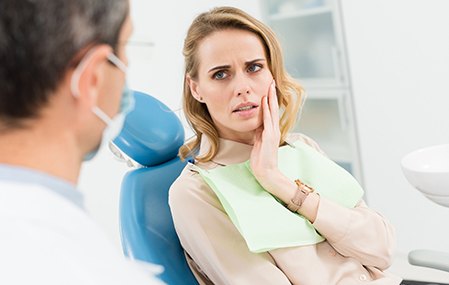
For urgent issues such as a broken arm, patients know they can visit their nearest emergency room for care. But when the emergency involves dental health, many people aren’t sure where to begin. At Pleasant Grove Family Dentistry, we do our utmost to see patients experiencing a dental emergency right away. If you need help with toothache, jaw pain, or other urgent dental problems, call our Texarkana dentist and team right away. In many cases, we’ll be able to see you on the same day you contact us; if we can’t, we can still help you with directions for at-home care and pain management.

You may be hesitant about reaching out to our practice for treatment if you’re not sure whether your dental issue counts as an emergency. It’s generally a good idea to reach out whenever you have doubts about your oral health; that way, you can get the care you need as soon as possible. Below are examples of urgent dental situations that we can help with.

Sometimes you may just need to have a tooth filled while in other cases you might require a root canal treatment. The amount you end up paying for your emergency dental care depends largely on the services that end up being performed to restore and protect your smile. When recommending any sort of procedure, we will always take the time to make sure that you have an idea of what the final price will look like.

We know that many dental emergencies simply cannot be avoided. However, there are some habits you can change to reduce your risk for dental emergencies, including:

Dental emergencies are typically sudden and overwhelming. Thankfully, your Texarkana emergency dentist has the tools and experience needed to provide quick, compassionate care for hurting smiles. Having the information you need ahead of time can help you be as prepared for an emergency as possible, so we’ve gathered some common questions we often get below. If you don’t see the information you’re looking for, don’t hesitate to give us a call right away!
Since most emergency rooms don’t have a dentist on staff, you’ll almost always save yourself time and money by giving us a call about your dental emergency first. However, you should go directly to your local ER for:
Any time you’re experiencing dental pain, you should give us a call. However, certain types of toothaches are warning signs of serious underlying issues that need immediate attention. Your toothache qualifies as a dental emergency if it’s accompanied by:
While it may be a nice change of pace if your painful tooth suddenly stops hurting, that doesn’t necessarily mean you’re out of the woods. Teeth don’t heal themselves like the rest of your body, so it’s unlikely that the root of the problem has been resolved. In fact, a toothache that suddenly goes away could be an indication of an injury or infection that’s damaged the nerve of your tooth! We need to see you right away to assess your situation and determine what treatments you need, even if you’re not currently in pain.
There are several steps you can take to manage a painful toothache until you can reach our office. Try flossing around your painful tooth to remove anything lodged between your pearly whites that could be causing the discomfort. Rinsing with warm salt water is also a good idea since this will simultaneously ease swelling and clear away harmful bacteria. You can also apply an ice pack or cold compress to the outside of your mouth for 10 minutes at a time to bring down inflammation and numb the pain.
You can also take over-the-counter pain relievers like Ibuprofen or Tylenol as directed by the instructions on their packaging. However, it’s important that you keep in mind that these are only meant to be temporary solutions until you can come to see us. Even if you can easily manage your toothache at home with these remedies, leaving the issue untreated will only allow it to grow worse and more difficult to treat.
Preventive Dentistry Restorative Dentistry Cosmetic Dentistry Sleep Apnea Therapy See Our Services